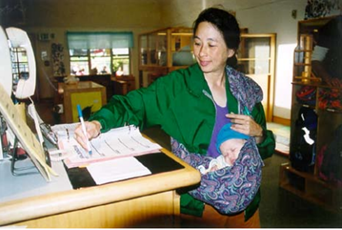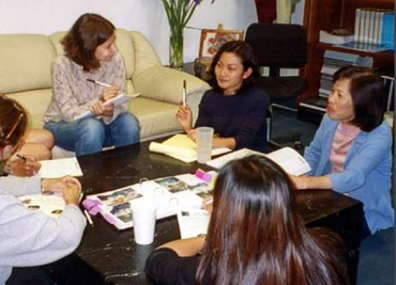15.3: Overarching Principles of Planning Curriculum for Infants and Toddlers
When planning curriculum for infants and toddlers we should keep the following principles in mind:
- The family is at the core of a young child’s learning and development. Family relationships have more influence on a child’s learning and development than any other relationships he has. Family members know him better than anyone else.
- Infant/toddler learning and development is grounded in relationships. Relationships provide infants and toddlers a secure emotional base from which they can explore and learn. Much of the cognitive, language, social, and physical learning a child experiences occurs while interacting with an adult. In fact, relationships with others are at the center of young children’s lives.
- Emotions drive early learning and development. A child’s emotional state drives early learning and greatly influences learning in other domains. The pleasure an infant experiences when receiving a positive response from a nurturing adult or when making a discovery motivates the child to continue engaging in positive interactions and exploration. For infants and toddlers, learning always has an emotional component. They are highly sensitive to the emotional cues of other people and are emotionally expressive in every situation
- Responsiveness to children’s self-initiated exploration fosters learning. Research shows that responsive care and nurturance not only promotes the development of emotional security in children, but learning and development in general.
- Individualized teaching and care benefits all children. Each child is unique. Infant/toddler care teachers use their understanding of each child’s blend of temperament, family and cultural experiences, language experiences, personal strengths, interests, abilities, and dispositions to support the child’s learning and development. Through recognizing and adapting to each child’s individual development, teachers are able to offer learning experiences that are responsive, meaningful, and developmentally attuned to each child. Providing interactions, experiences, and an environment that meet the individual needs of children with disabilities or other special needs can enrich the experiences of all children in the program. A classroom environment in which all children are supported and feel welcome creates rich learning experiences for everyone.

- Responsiveness to culture and language supports children’s learning. Responsive infant/toddler programs create a climate of respect for each child’s culture and language. Teachers and other program staff members partner and regularly communicate with family members to get to know the cultural strengths each child brings to the program. An essential part of being culturally and linguistically responsive is to value and support each child’s use of home language, as “continued use and development of the child’s home language will benefit the child as he or she acquires English.”
- Equally important are nurturing interactions with children and their families in which “teachers attempt, as much as possible, to learn about the history, beliefs, and practices of the children and families they serve.” In addition to being responsive to the cultural history, beliefs, values, ways of communicating, and practices of children and families, teachers create learning environments that include resources such as pictures, displays, and books that are culturally rich and supportive of diversity, particularly the cultures and languages of the children and families in their infant/toddler care setting.
- Intentional teaching and care enriches children’s learning experiences. Effective curriculum planning occurs when teachers are mindful of children’s learning and are intentional in their efforts to support it.
- Time for reflection and planning enhances teaching and care. In nurturing the development of infants and toddlers, teachers engage in an ongoing process of observation, documentation and assessment, reflection and planning, and implementation of strategies in order to provide individualized and small-group learning experiences. Curriculum planning requires time for teachers to reflect on children’s learning and plan strategies that foster children’s progress in building knowledge and mastering skills. Infant/toddler programs that support intentional teaching and care allocate time in teachers’ schedules for both individual and team reflection and planning. [1]

Pause to Reflect
Which of the overarching principles did you connect with the most? Why? Are there any that might be more challenging for you to embrace?
- The California Infant/Toddler Curriculum Framework by the California Department of Education is used with permission ↵

